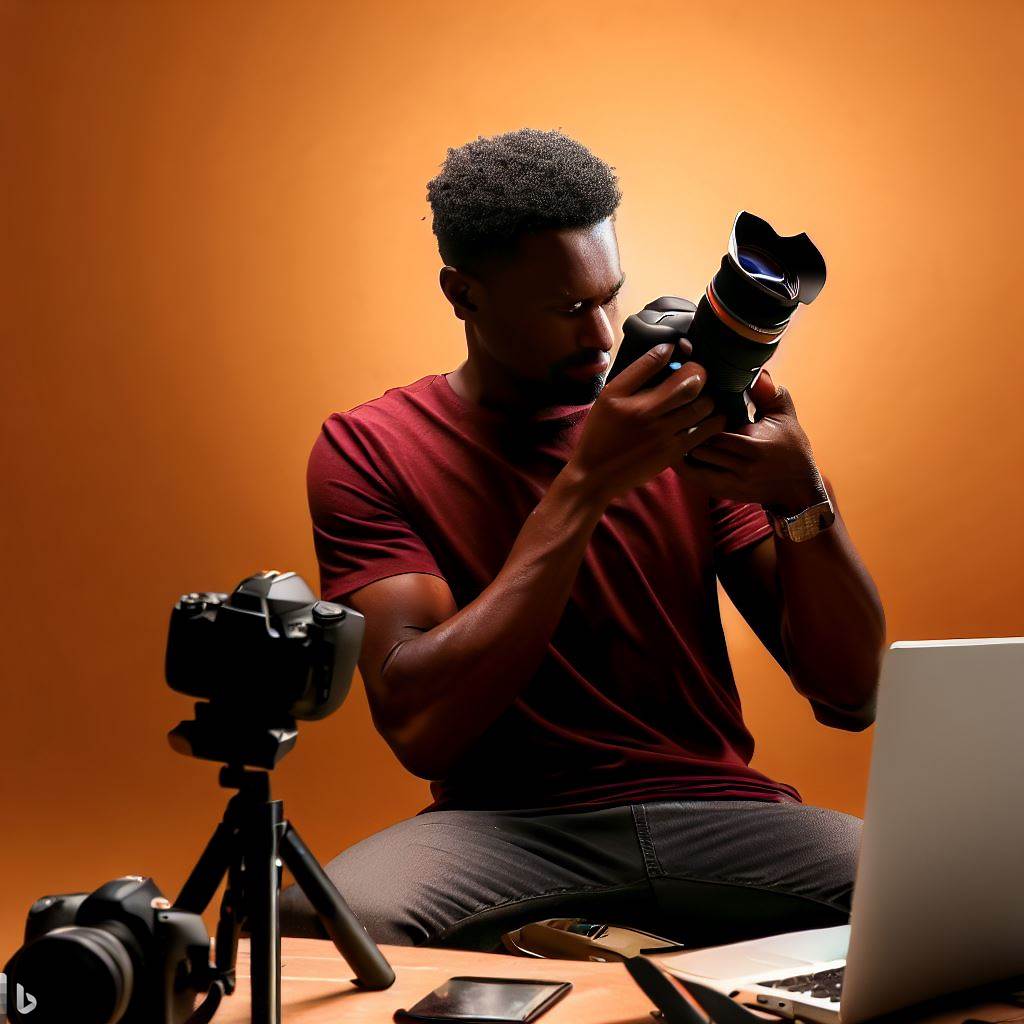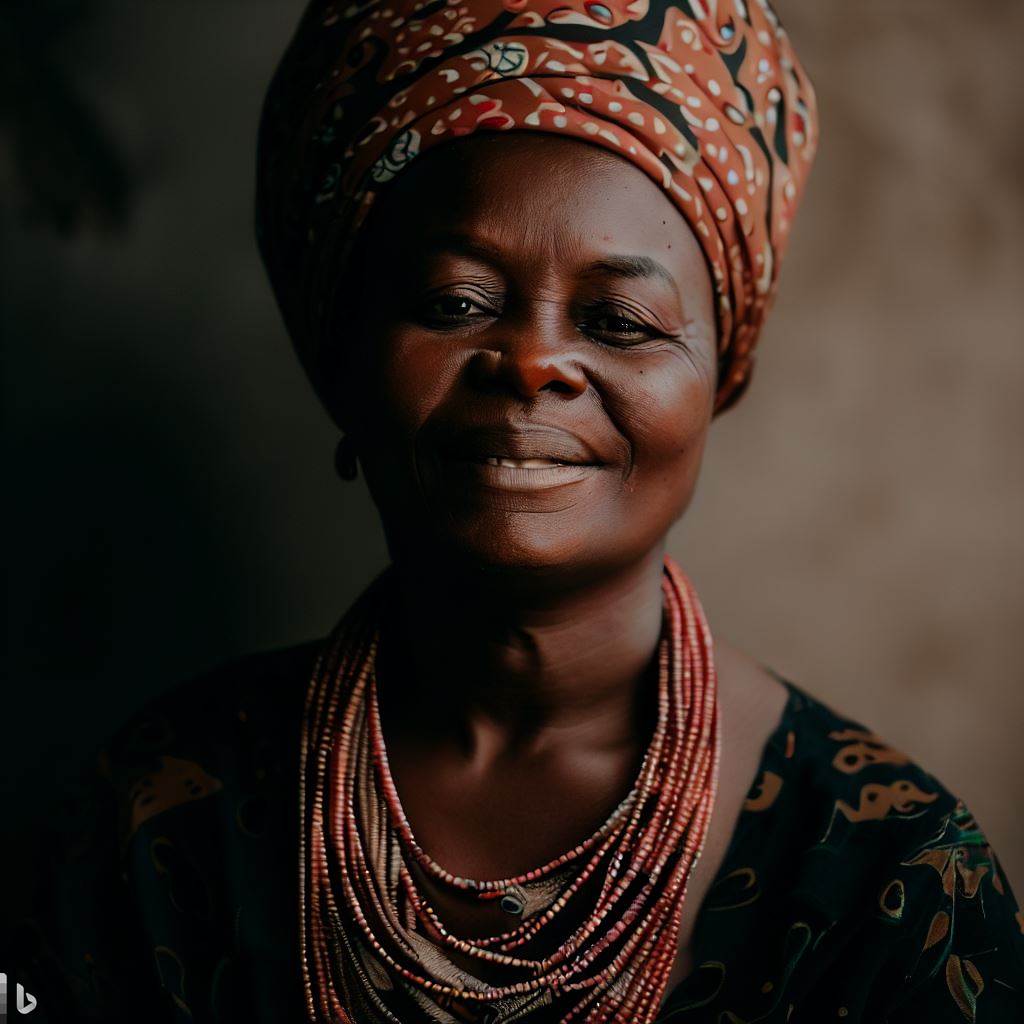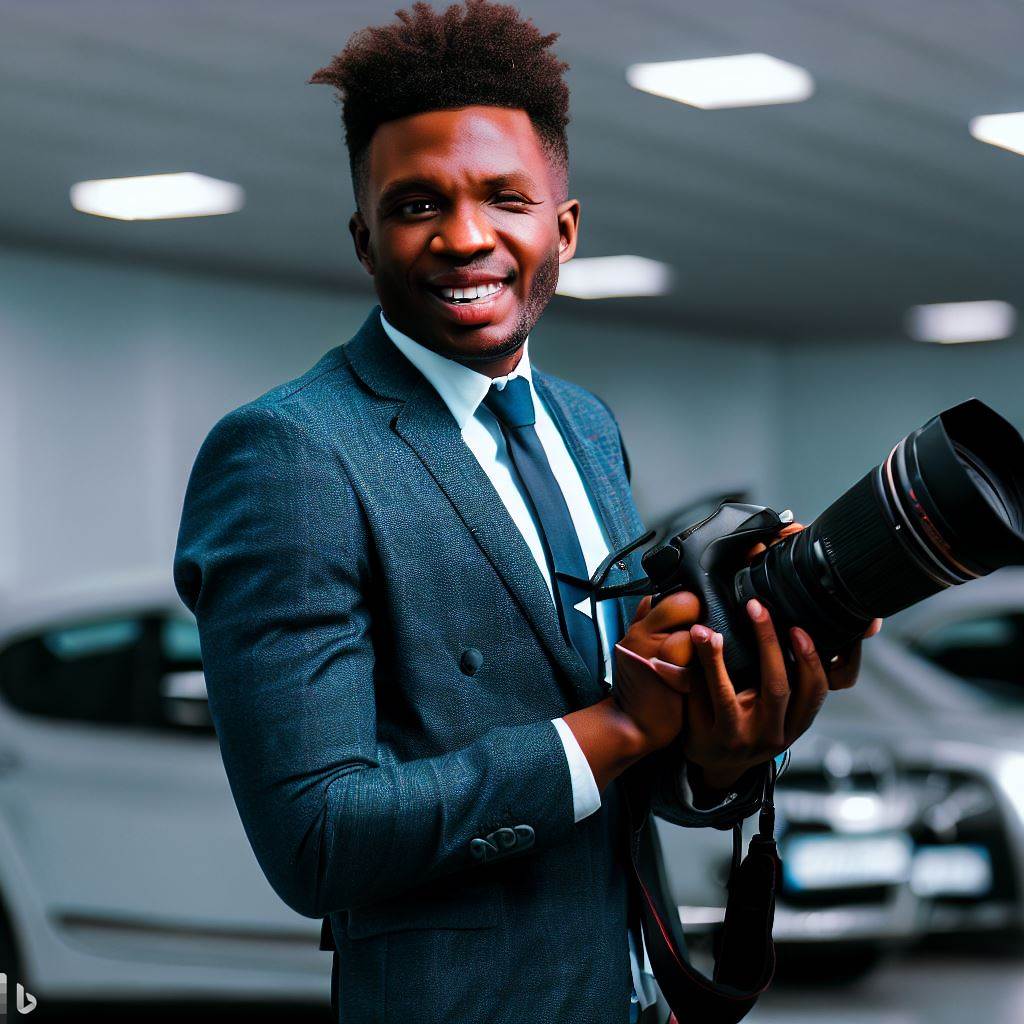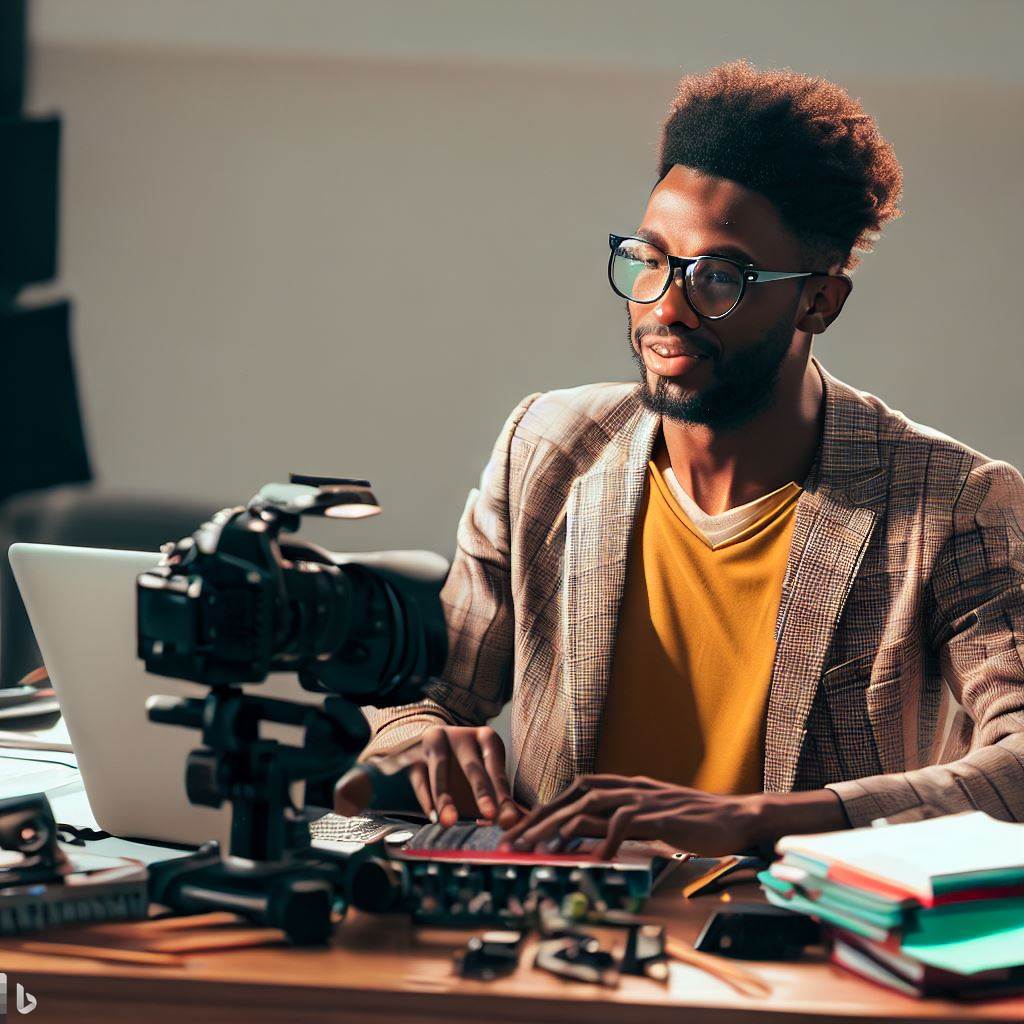Introduction
Examining photography equipment suitable for Nigerian photographers provides insights into their tools and gear preferences.
A. The Significance of Photography Equipment in Nigeria
Photography equipment is the lifeblood of every photographer in Nigeria. It’s the canvas, the brush, and the paint for these artists, crucial for capturing life’s moments.
B. Purpose of this Blog
This blog aims to be your trusted compass in the labyrinth of photography gear.
We’re here to provide Nigerian photographers with a comprehensive buying guide, making your choices simpler, informed, and rewarding. So, let’s dive in!
Understanding Different Types of Cameras
A. Explanation of DSLR cameras and their benefits
- DSLR stands for Digital Single Lens Reflex cameras.
- They have a larger image sensor, allowing for higher image quality and better low-light performance.
- DSLR cameras offer interchangeable lenses, giving photographers more flexibility in capturing different types of shots.
- They provide manual control over settings such as aperture, shutter speed, and ISO.
- DSLR cameras have an optical viewfinder, which shows exactly what the lens sees.
- They typically have a longer battery life compared to other types of cameras.
- DSLRs are suitable for professional photographers or those who want more control and versatility in their photography.
B. Introduction to mirrorless cameras and their advantages
- Mirrorless cameras, as the name suggests, do not have a mirror inside.
- They are generally smaller and lighter than DSLR cameras, making them more portable.
- Mirrorless cameras use electronic viewfinders or LCD screens to display the image.
- They have a silent shooting mode, which can be beneficial in certain situations.
- Mirrorless cameras can shoot at a faster burst rate and have faster autofocus capabilities.
- They often offer advanced features such as in-body image stabilization and 4K video recording.
- Mirrorless cameras are suitable for photographers who prioritize portability and convenience.
C. Point-and-shoot cameras and their suitability for certain circumstances
- Point-and-shoot cameras are compact, lightweight, and easy to use.
- They have a fixed lens and are designed for casual photography.
- Point-and-shoot cameras are ideal for travel or everyday snapshots.
- They often have automatic settings and scene modes for different shooting conditions.
- Point-and-shoot cameras may have limited manual control compared to DSLR or mirrorless cameras.
- They are affordable and great for beginners or those who want hassle-free photography.
- However, point-and-shoot cameras may not produce the same level of image quality as DSLR or mirrorless cameras.
Read: Photography Schools in Nigeria: Where Talent Meets Technique
Essential Camera Features to Consider
A. Sensor size and its impact on image quality
- A larger sensor size generally produces better image quality, especially in low-light situations.
- Full-frame sensors are preferred for professional photographers as they offer superior image quality.
- Crop sensors are more affordable and suitable for beginners or hobbyist photographers.
B. Megapixels and their significance in capturing detail
- Megapixels determine the amount of detail a camera can capture.
- Higher megapixel count is beneficial for large prints or extensive cropping.
- For most photographers, a camera with 20-24 megapixels is sufficient for everyday use.
C. ISO range and its importance in low-light situations
- ISO measures the camera’s sensitivity to light.
- A wider ISO range allows photographers to shoot in low light without excessive image noise.
- Cameras with good high ISO performance are essential for night photography or indoor shooting.
D. Autofocus capabilities and the need for fast and accurate focusing
- Autofocus helps to keep subjects sharp and in focus.
- Look for cameras with advanced autofocus systems that offer quick and accurate focusing.
- Consider the number of autofocus points and their coverage across the frame.
E. Burst mode and its usefulness for capturing action or fast-paced events
- Burst mode allows the camera to capture multiple frames per second.
- This feature is essential for sports photography, wildlife, or any fast-moving subject.
- Check the camera’s burst mode capabilities and buffer size to ensure continuous shooting without limitations.
These camera features are important considerations when purchasing photography equipment.
Each feature plays a crucial role in capturing high-quality images and enhancing your photographic experience.
Assess your specific needs and budget to find a camera that ticks all the boxes and helps you achieve your creative vision.
Lens Selection and Their Influence on Photography
A. Overview of Prime Lenses and Their Benefits
- Prime lenses have a fixed focal length, providing high image quality and sharpness.
- They offer wide apertures, allowing for low-light photography and beautiful bokeh.
- Prime lenses are lightweight, compact, and perfect for portrait, street, and landscape photography.
- They encourage photographers to move around and experiment with different angles and perspectives.
- Prime lenses have excellent optical performance, producing images with minimal distortion and chromatic aberration.
B. Explanation of Zoom Lenses and Their Versatility
- Zoom lenses have adjustable focal lengths, offering flexibility in framing and composition.
- They allow photographers to magnify distant subjects without physically moving closer.
- Zoom lenses are convenient for capturing a wide range of subjects, from landscapes to wildlife.
- They provide the convenience of quickly adjusting the focal length without changing lenses.
- Zoom lenses can be heavy and bulkier compared to prime lenses, affecting portability.
C. Different Types of Lens Mounts and Compatibility Considerations
- Each camera brand has its own lens mount system that determines lens compatibility.
- It is essential to ensure the lens mount is compatible with your camera to avoid compatibility issues.
- Popular lens mounts include Canon EF, Nikon F, Sony E, and Micro Four Thirds.
- Consider the availability of lenses and accessories for the chosen lens mount system.
- Adapter rings are available to use lenses from different mounts with certain limitations.
D. Lens Focal Length and Its Impact on Composition and Style
- Focal length influences the angle of view and magnification of the captured image.
- Wide-angle lenses (10-35mm) provide a broader perspective, ideal for landscapes and architectural photography.
- Normal lenses (35-70mm) closely replicate the human eye’s perspective, suitable for general photography.
- Telephoto lenses (70mm and above) offer a narrow field of view, ideal for sports and wildlife photography.
- The choice of focal length contributes to the composition, mood, and storytelling of the photograph.
As a Nigerian photographer, understanding the various types of lenses and their impact on photography is crucial for making informed gear choices.
Whether you prefer the prime lens’s image quality and versatility or the zoom lens’s convenience and flexibility, considering lens mounts and focal length will greatly influence your photography style and composition.
Invest in lenses that align with your artistic vision and technical requirements and remember to experiment and push the boundaries of your creativity.
Read: Nigerian Wedding Photography: A Beautiful and Lucrative Niche
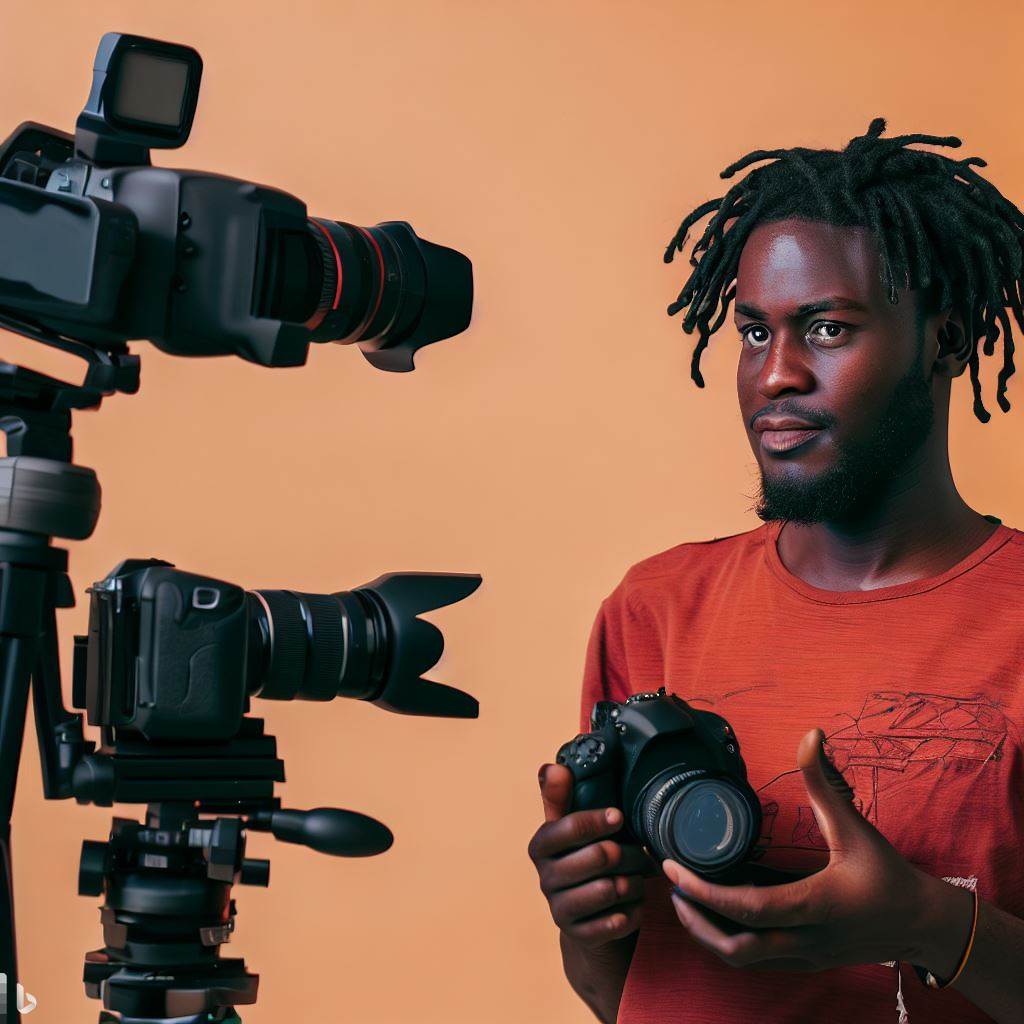
Additional Photography Equipment and Accessories
A. Tripods: Stability and Long-Exposure Shots
- Tripods are essential for achieving stability in your shots, especially for long-exposure photography.
- They help prevent camera shake, resulting in sharper images.
- Tripods also allow you to experiment with long-exposure techniques, capturing motion blur or light trails.
B. External Flash Units: Benefits in Low-Light Situations
- External flash units are invaluable when shooting in low-light conditions.
- They provide additional light, reducing shadows and improving image quality.
- Using an external flash also allows for more control over the direction and intensity of the light.
C. Filters: Enhancing and Modifying Images
- Filters have various effects on enhancing or creatively modifying images.
- Polarizing filters reduce glare and improve color saturation, especially for outdoor photography.
- Neutral density filters help control exposure by reducing the amount of light entering the lens.
D. Memory Cards: High-Speed and Reliable Storage
- High-speed and reliable memory cards are crucial for photographers.
- They ensure fast and efficient data transfer, allowing for continuous shooting and capturing high-resolution images.
- Choose memory cards with sufficient capacity to accommodate your shooting needs.
E. Camera Bags and Cases: Protection and Convenience
- Invest in a good camera bag or case to protect your gear during travels.
- Look for bags with padding and compartments to organize and safely carry your camera equipment.
- Choose a bag or case that suits your style and provides ease of access to your gear.
When considering additional photography equipment and accessories, remember to prioritize your specific needs and budget.
Each item serves a unique purpose and can enhance your photographic experience.
Read: Challenges and Opportunities in Nigeria’s Photography Industry
Determining Budget and Value for Money
A. Tips for setting a photography equipment budget
- Start by evaluating your current financial situation and set a realistic budget.
- Consider your photography goals and how much you are willing to invest in your craft.
- Research the average prices of essential photography equipment in Nigeria.
- Allocate a percentage of your budget for each type of equipment, such as camera body, lenses, and accessories.
- Prioritize the most important equipment based on your photography style and needs.
- Consider including a contingency fund in case of unexpected expenses or opportunities.
B. Researching prices and comparing options
- Visit local photography stores and online retailers to gather price information.
- Compare prices between different sellers to ensure you get the best deal.
- Read customer reviews and ratings to assess the quality and reliability of the equipment.
- Consider purchasing second-hand or refurbished equipment to save money.
- Explore package deals or bundle offers to get multiple items at a discounted price.
C. Considering long-term value and sustainability of the chosen equipment
- Research the durability and lifespan of the equipment you are considering.
- Check if the manufacturer offers warranties or guarantees for their products.
- Consider the compatibility of the equipment with future upgrades or additions.
- Evaluate the potential resale value of the equipment in case you decide to upgrade later.
- Assess the overall cost of ownership, including maintenance, repairs, and recurring expenses.
- Take into account the environmental impact of the equipment and opt for sustainable options if available.
By following these tips, you can set a reasonable budget for your photography equipment and make informed purchasing decisions.
Remember, investing in quality equipment that suits your photography needs will ultimately enhance your skills and creativity.
Read: Fashion Designer Salaries in Nigeria: An Inside Look
Where to Buy Photography Equipment in Nigeria
A. Online marketplaces and e-commerce platforms
- Jumia: One of the largest online retailers in Nigeria, offering a wide range of photography equipment.
- Konga: Another popular online marketplace that sells various camera gear and accessories.
- OLX: A classifieds website where individuals can buy and sell new or used photography equipment.
- Amazon: Although not based in Nigeria, Amazon ships to Nigeria and offers a vast selection of photography equipment.
- AliExpress: Similar to Amazon, AliExpress offers a wide variety of photography equipment options.
B. Physical camera stores and retailers in major cities
- Yabaleft Online: Located in Lagos, Yabaleft Online is a well-known physical store that sells photography equipment.
- Fotostores: With branches in Lagos, Abuja, and Port Harcourt, Fotostores is a trusted name in the industry.
- Camerapeople: Situated in Abuja, Camerapeople offers a range of cameras, lenses, and other accessories.
- Large Format Nigeria: Specializing in large format cameras, this store is based in Lagos.
- Pointek: A major retailer with stores in Lagos, Abuja, and other Nigerian cities, offering various camera brands.
C. Recommendations for trusted sellers and authorized dealers
- Canon Nigeria: The official Canon website provides a list of authorized dealers in Nigeria.
- Nikon Nigeria: Similarly, Nikon’s official website offers a directory of authorized dealers and service centers.
- Fujifilm Nigeria: For Fujifilm enthusiasts, their website lists official dealers across the country.
- Sony Nigeria: Sony’s official website provides information about authorized sellers and support centers.
When purchasing photography equipment, it’s essential to consider factors like reliability, customer service, and warranty.
Online marketplaces and e-commerce platforms provide convenience and a wide variety of options, but it’s crucial to buy from trusted sellers, read customer reviews, and ensure secure payment methods.
On the other hand, physical camera stores offer the advantage of hands-on experience and expert advice from knowledgeable staff.
It’s advisable to visit these stores, especially when making significant purchases, to ensure the equipment meets your requirements.
Always check if a seller is an authorized dealer for a specific brand, as this guarantees the authenticity of the products and access to after-sales support.
Manufacturers’ official websites provide lists of authorized dealers in Nigeria for major brands like Canon, Nikon, Fujifilm, and Sony.
Lastly, when buying used equipment from classifieds websites or other individuals, it’s important to inspect the items thoroughly and, if possible, test them before finalizing the purchase.
Requesting original receipts or warranty documents can also help verify the equipment’s authenticity and previous ownership.
To sum it up, Nigerian photographers have various options for buying photography equipment, both online and in physical stores.
By considering factors like reliability, customer reviews, authorized dealers, and personal preferences, photographers can find the perfect equipment to enhance their craft.
Read: Boost Your Nigerian Career with PhotoLab: Must-Know Secrets!
Key Factors to Consider Before Making a Purchase
A. User reviews and testimonials for specific equipment
- Read reviews from other photographers who have used the equipment to get honest opinions.
- Look for testimonials that mention the quality, performance, and reliability of the equipment.
- Consider the feedback from users who have similar needs and preferences as you do.
B. Warranty and after-sales support offered by manufacturers or sellers
- Check the warranty period offered by the manufacturer to ensure it is sufficient for your needs.
- Find out what the warranty covers, such as repairs, replacements, or refunds.
- Consider the availability of after-sales support, such as customer service or technical assistance.
C. Evaluating the overall quality and durability of the equipment
- Inspect the materials used in the equipment’s construction to ensure they are of high quality.
- Check for any signs of poor craftsmanship, such as loose parts or flimsy components.
- Research the brand’s reputation for producing durable and reliable photography equipment.
D. Assessing the reputation and reliability of the brand or manufacturer
- Research the brand’s history and how long they have been in the photography equipment industry.
- Find out if the brand is known for consistently producing high-quality and reliable products.
- Consider the opinions of other photographers and professionals in the industry regarding the brand.
Making an informed decision before purchasing photography equipment is crucial to ensure you get the best value for your money.
By considering these key factors, you can minimize the risk of purchasing equipment that may not meet your needs or expectations.
Conclusion
A. Recap of the main points discussed in the blog post
Throughout this blog post, we have explored some essential aspects of buying photography equipment in Nigeria.
We began by discussing the importance of understanding your needs and setting a budget.
Next, we delved into the various types of cameras available in the market, including DSLRs and mirrorless cameras, and highlighted their key features and benefits.
We also emphasized the significance of investing in quality lenses and recommended different types of lenses for various photography genres, such as portrait, landscape, and wildlife photography.
Additionally, we touched upon other essential accessories like tripods, memory cards, and camera bags that can enhance your photography gear.
B. Encouragement for Nigerian photographers to make informed decisions when buying photography equipment
As we conclude, we want to encourage Nigerian photographers to make informed decisions when purchasing photography equipment.
Understanding your unique style and needs as a photographer will help you select the right equipment for capturing stunning images.
Take your time to research and compare different brands and models, read reviews, and seek recommendations from professionals or fellow photographers.
Remember, buying photography equipment is an investment in your passion and craft, so it is essential to choose wisely and select gear that will suit your creative vision and enable you to excel in your photography journey.
With the right equipment, coupled with your skills and creativity, you can elevate your photography to new heights and capture extraordinary moments that leave a lasting impact.
So, go ahead and start building your photography gear collection, keeping in mind the key points discussed in this blog post, and embark on your photographic adventures with confidence.
Remember, great photography is not just about the equipment you use but also about the story you tell through your images.
Stay passionate, keep learning, and never stop exploring the beautiful world of photography.

